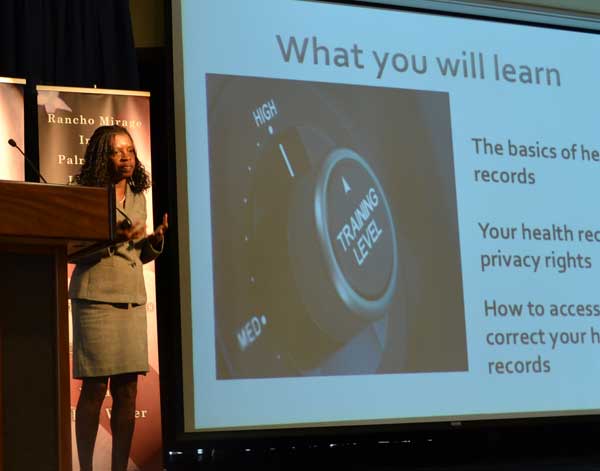Educating seniors on health care fraud
Months before the Affordable Care Act (ACA) was signed into law in 2010, seniors were bombarded with misinformation claiming that the law would slash their Medicare benefits, create so-called “death panels,” and eliminate the Medicare Advantage managed care program. When key provisions of the law went into effect last October, many senior citizens were confused about how the law would impact them and their Medicare health benefits.
Despite the fact that the ACA does not directly affect Medicare, scammers had a field day around the law. Seniors nationwide came under unrelenting attack from false messages about the need to re-apply for Medicare, bogus money saving programs and threats of jail and fines for not signing up for new health care programs. These efforts were really intended to gain unauthorized access to personal information that could be used to commit credit fraud.
For two days in January, Consumer Action joined Congressman Raul Ruiz (D-CA), a former emergency room physician, to educate seniors in his Southern California district about health care fraud. Dr. Ruiz introduced a bill last year that would task the U.S. Department of Health and Human Services to work with the Department of Justice to generate a report with policy recommendations to combat the most prevalent health care schemes. The findings would be used to educate and inform senior citizens. Dr. Ruiz has said his bill is designed to provide more information “on ways criminals are working to defraud seniors through health care scams and to bring criminals to justice. It’s vital that seniors know and recognize the warning signs of fraud and report the activity to law enforcement.”
Linda Williams of Consumer Action said she was gratified to participate, not only professionally as a consumer advocate, but personally as well. She recounted having to convince her 92-year-old mother that calls warning of the need to buy additional health care coverage because of Obamacare were a telemarketing scam. “My mother was convinced she was about to lose her Medicare benefits,” said Williams.

Williams reviewed portions of Consumer Action’s MoneyWi$e ID theft module to educate seniors on how to protect themselves against medical ID theft, provided steps to avoid fraud when a loved one dies and outlined tricky techniques scammers use to obtain personal information. She also reviewed Consumer Action’s Health Records Privacy module, which covers what information is found in medical records, the benefits and risks of electronic records, what medical privacy rights you have, and what to do when your medical privacy rights are violated.
Williams encouraged the group to report suspected fraud related to Obamacare. She provided the number of a new federal health care marketplace call center (800-318-2596) that can answer questions about suspected fraud. To report Medicare fraud, or to inquire about possible scams relating to Medicare recipients, Williams suggested calling Medicare (800-633-4227) directly.
The Medicare website (www.Medicare.gov) offers Top 5 things to know about the Affordable Care Act if you have Medicare.
- Medicare isn’t part of the Health Insurance Marketplace established by ACA, so you don’t have to replace your Medicare coverage with Marketplace coverage.
- You get more preventive services, for less. Medicare now covers certain preventive services, such as mammograms or colonoscopies, without charging you for the Part B coinsurance or deductible. You also can get a free yearly “Wellness” visit.
- You can save money on brand-name drugs. If you’re in the Medicare donut hole, you’ll get a 50% discount when buying Part D-covered brand-name prescription drugs.
- Your doctor gets more support through new initiatives to support care coordination.
- The ACA will help extend Medicare to at least 2029 due to reductions in waste, fraud and abuse, and Medicare costs.



